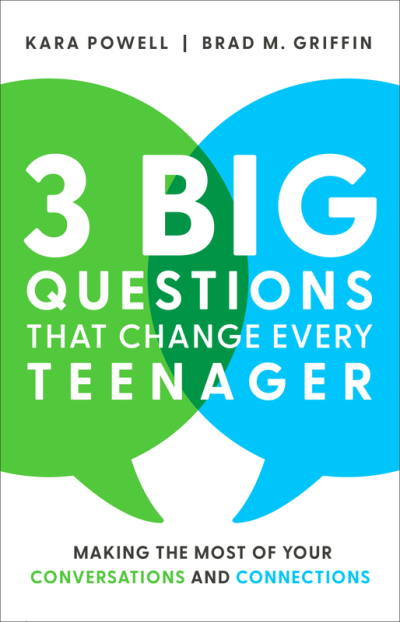3 biggest questions every teen is asking; how church leaders should respond

The Church is missing out on reaching a whole generation of young people for one simple reason: It’s answering questions Gen Z simply isn’t asking.
That’s according to Kara Powell, the chief of leadership formation and executive director of the Fuller Youth Institute at Fuller Theological Seminary, who in an interview with The Christian Post explained that many well-intentioned adults, pastors, parents and pastors often focus on subjects that aren't the most pressing questions for young people.
“Our world is always changing, and at Fuller Seminary, we spent a fair amount of time the last few years not only interviewing kids but reflecting on, ‘What are the better Jesus-centered answers we would want young people to lean into and be discipled toward?’” the mother-of-three said. “We wanted to determine, what are young people's most pressing questions? How do we point them to Jesus' best answers for those questions?"
Powell’s latest book, 3 Big Questions that Change Every Teenager: Making the Most of Your Conversations and Connections, co-authored with Brad M. Griffin, seeks to identify and answer these questions. Intended to serve as a resource for churches and parents, the book is based on landmark research from the Fuller Youth Institue and in-depth interviews with data from 2,200 diverse teenagers.

According to the authors, every teenager is asking, “Who am I? Where do I fit in? What difference can I make?” Powell placed these questions into three categories: Identity, belonging and purpose.
“Young people are basing their identity on the expectations of others; their friends, their family, sometimes their church, their volleyball team, their basketball teams, their neighbors, etc.,” Powell explained. “So they're often figuring out who they are based on what others expect.”
“We want young people to know that they are enough in a world that constantly tells them they are not enough,” she continued. “We want them to know that Jesus makes them enough. In fact, Jesus makes them more than enough. They can rest in how they are made in God's image.”
When it comes to belonging, most young people say, “I belong when I feel safe,” Powell said, adding: “Statistics show that young people are just so hungry for safety in the form of friends, sometimes family, and rarely, churches.”
“The word that we offer for parents and pastors is ‘with,’” the author said. “We want young people to know that they experienced their deepest sense of connection with God's people, with a community that shows them unconditional love, with a group in which they are both giving and receiving and being shaped and shaping.”
Finally, the majority of young people said they find purpose when they are helping others — an answer Powell said is both “encouraging” and concerning.
“What we saw was that young people were often working so hard to help others that they were ending up burned out, stressed out and too busy. If that purposeful service isn't grounded in a theology of the Gospel and what it means to be part of God's Kingdom, then I think even a motivation to help will eventually fall short,” she posited.
The single-word response to the issue of purpose, Powell said, is “story.”
“We think God is writing an incredible story and every young person has a page in God's story,” she said. “They’re only a paragraph into that story. How can we as adults help them continue to write out that page and help them reflect who they are and who God wants them to be?”
Overall, there is “great potential in young people's current answers” — but such answers “can be strengthened if we really understood Jesus as answers to those questions,” Powell stressed.
“I would encourage parents, adults and church leaders to really spend time listening and empathizing with young people, to try to understand in the midst of these big categories — what are the sub-questions that young people are wondering about? And then, very importantly, what are the ways that young people are currently trying to answer these questions?”
While every person, regardless of their age and gender, struggles with these questions, Powell explained that these questions are particularly pressing for Gen Z. Today’s teens, she said, represent the most anxious, diverse and adaptive generation in history.
“We can't talk about young people without talking about their challenges with mental health, almost all of which have gotten more troubling during the pandemic. This is a generation struggling with anxiety, depression and even suicide,” she contended.
“But secondly, they're adaptive and creative. This is a generation of leaders that are trying to figure out how they can help the world. They have a lot of agency and are very resilient, sometimes because of the adult support they've received and other times because of the lack of the adult support they've received.”

Today’s young people are also inundated with social media like never before. A fact that directly impacts their sense of identity, belonging and purpose in both positive and negative ways.
“When it comes to identity, there's something that can be really positive about a young person experimenting on social media with who they are. Small doses of that are acceptable, if not healthy. The problem is that for young people, it's often moderate to large doses,” the Sticky Faith author explained.
Social media also impacts belonging. Though technology was a “social lifeline” for many young people during the pandemic, it can also create “insecurity and feelings of abandonment” in young people, Powell explained. And when it comes to purpose, many young people are using social media to be involved in positive things like service and Kingdom justice.
However, she said, there’s a danger that simply adding a hashtag like "justice" to a social media post gives a teen the sense that they're involved in substantive work when that's not always the case.
"Technology can be a gift in helping young people develop identity, belonging and purpose, but it can also point them to those false answers," she said.
The goal of 3 Big Questions, Powell said, is to help adults, families, churches and ministries “know what to do and what to say to better connect with young people they care about most and help them reach their full potential.
“We really need young people to shape the future of the Church,” she emphasized. “We need this generation of young people to show us new ways to love Jesus and new ways to be the Church. Adults need to link arms with the next generation to do so.”
“A vision for the Church that puts all the weight on young people's shoulders is flawed, and a vision for the Church that has young people on the sidelines and the weight on adults’ shoulders is flawed,” she added.
“My vision for the Church is that my 18 year old is building relationships with a 48 year old and a 68 year old, and together they're showing all of us new ways to love Jesus and love our neighbor as ourselves.”





















